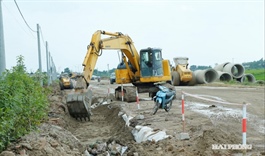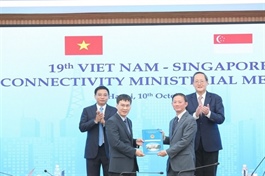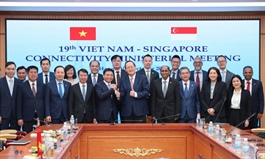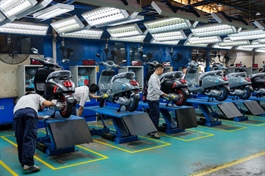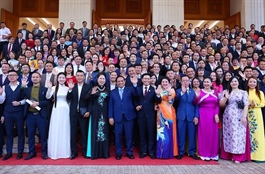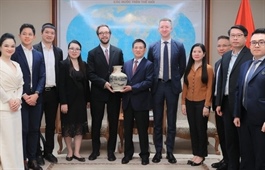HCM City sets sights on becoming major services hub of the country, region
HCM City sets sights on becoming major services hub of the country, region
HCM City aims to raise the service sector’s share to between 70 and 80 per cent of its gross regional domestic product, focusing on premium, modern and high value-added services to reaffirming its ambition of becoming the leading service hub of the country and the wider Southeast Asia region, city leaders said.

A view of HCM City. HCM City seeks to transform into a major services hub of the country and region with premium, modern, and high-value-added services. — VNA/VNS Photo |
According to the city’s Statistics Office, the city’s GRDP in the first nine months of 2025 grew by 7.07 per cent year-on-year, up from 6.56 per cent in the first half. The service sector remains the main growth engine, expanding by 8.59 per cent, accounting for 51.6 per cent of GRDP and contributing 61.2 per cent to overall growth.
Vice Chairman of the HCM City People’s Committee Nguyễn Văn Dũng said that over the years, the service sector had accounted for 60–65 per cent of the city’s GRDP. After the merger with Bình Dương and Bà Rịa–Vũng Tàu, the proportion now stands at 51 per cent, reflecting both structural diversification and significant untapped potential.
The administrative expansion creates an urgent need for restructuring. The former HCM City will serve as the financial, commercial, educational and healthcare hub; the former Bình Dương as the industrial and logistics base; and the former Bà Rịa–Vũng Tàu as the deep-water port, oil and gas, and tourism centre.
“This is an important synergistic advantage, but it will only be fully realised if the city undertakes strong restructuring focused on high-quality service sectors,” he said.
To achieve this vision, the city has developed a project titled: ‘Transforming HCM City into a Major National and Regional Service Hub with Premium, Modern and High Value-Added Service Industries.’
Specifically, HCM City aims to develop itself into an international financial centre; make logistics a spearhead sector; promote international education and high-end healthcare; develop premium tourism, and attract more foreign direct investment into high-tech and innovation-driven services. It also plans to form specialised service areas such as exhibition, financial and fashion centres.
Dũng emphasised that developing high-quality services is not only an economic target but also a strategy for building a modern, sustainable and distinctive metropolis that enhances both competitiveness and residents’ quality of life.
Vũ Đoàn Thái Long, senior project manager at Roland Berger Vietnam, noted that the services’ share rose from 40 per cent in 2010 to 51 per cent in 2024, overtaking the industrial sector. However, the sector still lags behind regional service centers such as Bangkok (where services account for 88 per cent) and Singapore (71 per cent).
He identified several persistent challenges, including underdeveloped connectivity infrastructure, reliance on traditional business models, the dominance of small- and medium-sized enterprises, and limited competitiveness.
He proposed a regional functional zoning approach under which HCM City focuses on financial services; the former Bình Dương on high-tech and transportation; and the former Bà Rịa–Vũng Tàu on tourism and seaport logistics.
Focusing on productivity and connectivity
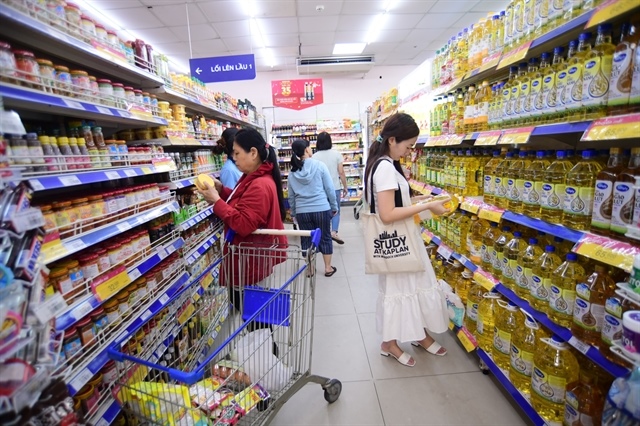
A view of HCM City. HCM City seeks to transform into a major services hub of the country and region with premium, modern, and high-value-added services. — VNA/VNS Photo |
Economist Nguyễn Trọng Hoài recommended that the city concentrate on two key service clusters: productivity enhancement and global connectivity.
The city must take the lead in technological innovation and digital transformation by creating regulatory sandboxes for fintech, AI and blockchain, and investing in a high-quality workforce to boost productivity. Priority sectors include high technology, the digital economy, international finance, logistics and supply chain management.
He added that education and vocational training must modernise to equip graduates with global-standard skills, while developing ASEAN-standard healthcare could boost productivity, attract international talent and drive medical tourism.
The digital economy, which already contributes about 20 per cent of GRDP, should be expanded through investment in digital infrastructure, cloud computing, e-payments and start-ups.
The global connectivity cluster, centred on finance, banking and insurance, is also vital. The success of the HCM City International Financial Centre depends on competitive tax, visa and investor protection policies, and openness to new financial models such as digital assets.
In logistics, the city can leverage its strategic advantages, including the Cái Mép–Thị Vải deep-water port, the planned Cần Giờ transshipment port and a network of key airports. Developing eight large logistics hubs and completing ring roads, expressways and metro lines will reduce costs and expand global market access.
By steadfastly implementing solutions focused on the two strategic service clusters — productivity enhancement and global connectivity — HCM City can become a leading regional hub for finance, commerce, and science–technology in the coming decade, he said.
Associate Professor Võ Thị Ngọc Thúy of the University of Economics HCM City proposed adding digital economy and education services to the city’s nine key sectors and developing premium service brands tied to national identity.
“If we move too slowly, foreign enterprises may dominate the high-end service market,” she warned, calling for stronger domestic brands capable of building full-service ecosystems.
With its strong economic foundation, strategic location and long-term vision, HCM City is steadily advancing towards its goal of becoming a modern, high value-added service hub for Việt Nam and the region.
- 08:46 13/10/2025



